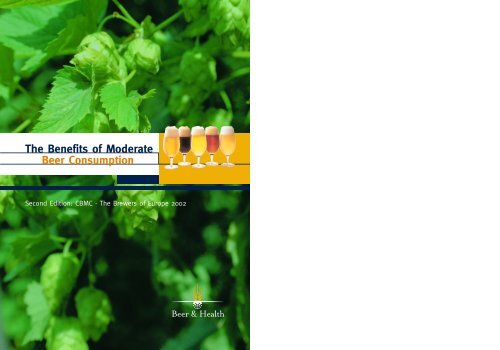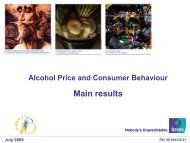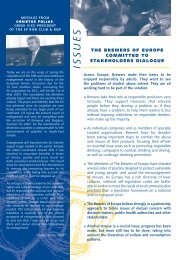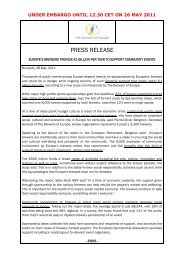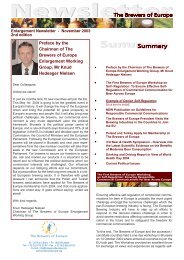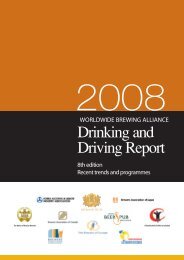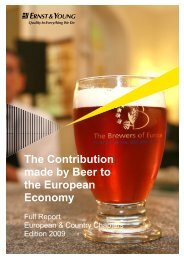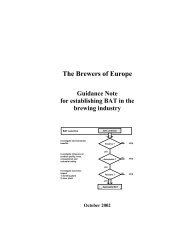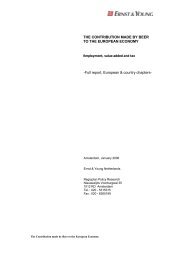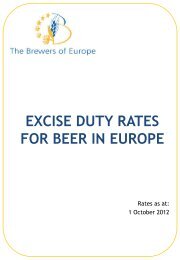Beer Consumption The Benefits of Moderate - The Brewers of Europe
Beer Consumption The Benefits of Moderate - The Brewers of Europe
Beer Consumption The Benefits of Moderate - The Brewers of Europe
Create successful ePaper yourself
Turn your PDF publications into a flip-book with our unique Google optimized e-Paper software.
<strong>The</strong> <strong>Benefits</strong> <strong>of</strong> <strong>Moderate</strong><br />
<strong>Beer</strong> <strong>Consumption</strong><br />
Second Edition: CBMC - <strong>The</strong> <strong>Brewers</strong> <strong>of</strong> <strong>Europe</strong> 2002
<strong>The</strong> <strong>Benefits</strong> <strong>of</strong> <strong>Moderate</strong><br />
<strong>Beer</strong> <strong>Consumption</strong><br />
Second Edition: CBMC - <strong>The</strong> <strong>Brewers</strong> <strong>of</strong> <strong>Europe</strong> 2002<br />
Contents<br />
Introduction 5<br />
Moderation and responsibility are the key words 6<br />
<strong>Moderate</strong> consumption <strong>of</strong> alcoholic drinks can be good for your heart 8<br />
<strong>Beer</strong> is just as good at protecting the heart as wine 9<br />
<strong>The</strong> effect <strong>of</strong> lifestyle 10<br />
Other beneficial effects from moderate consumption <strong>of</strong> alcoholic drinks 11<br />
<strong>Beer</strong> can make a positive contribution to a healthy diet! 12<br />
Potential benefits from the natural ingredients in beer 14<br />
• Antioxidants<br />
• Vitamins and minerals<br />
• Hops<br />
Drinking beer in moderation does not make you fat 16<br />
And finally… 17<br />
References 18<br />
3
4 <strong>The</strong> <strong>Benefits</strong> <strong>of</strong> <strong>Moderate</strong> <strong>Beer</strong> <strong>Consumption</strong><br />
Introduction<br />
• This booklet summarises the current state <strong>of</strong> knowledge on the beneficial effects associated<br />
with moderate consumption <strong>of</strong> alcoholic drinks, in particular beer. It has been compiled by<br />
<strong>The</strong> <strong>Brewers</strong> <strong>of</strong> <strong>Europe</strong> to inform the general public <strong>of</strong> the clear evidence that beer, a wholesome<br />
beverage and a staple part <strong>of</strong> our diets for thousands <strong>of</strong> years, is not only good to<br />
drink but may also be good for health when consumed moderately.<br />
• <strong>The</strong> information is not intended to encourage people to consume beer, or other drinks, for<br />
their health benefits. <strong>The</strong> intention is to inform and reassure those who enjoy drinking beer<br />
that, when consumed moderately, it is not a health risk and there may be a net benefit.<br />
• <strong>The</strong> first edition <strong>of</strong> this booklet was inspired by a one-day seminar on the health benefits <strong>of</strong><br />
moderate alcohol consumption and the healthful properties <strong>of</strong> beer held in November 1999<br />
which included presentations from many <strong>Europe</strong>an experts.<br />
• <strong>The</strong> second edition follows a further symposium held in October 2001 to examine the latest<br />
scientific evidence on this subject. Speakers included Pr<strong>of</strong>essor Antonio Gasbarrini; Catholic<br />
University, Rome, Italy; Dr Pilar Cordoñer Franch, University <strong>of</strong> Valencia, Spain; Pr<strong>of</strong>essor Dr<br />
Denis de Keukeleire, Ghent University, Belgium; Dr Norbert Frank, German Cancer Research<br />
Centre, Heidelberg, Germany; Dr Caroline Walker, Brewing Research International, Nutfield, UK;<br />
Dr Jonathan Powell, St Thomas’ Hospital, London, UK; Pr<strong>of</strong>essor Mack Mitchell Jr., Alcoholic<br />
Beverage Medical Research Foundation, Baltimore, USA; and Dr Eric Skovenborg, General<br />
Practitioner, Denmark. <strong>The</strong>ir presentations are the main reasons for <strong>The</strong> <strong>Brewers</strong> <strong>of</strong> <strong>Europe</strong><br />
being inspired to revise this edition.<br />
• At the first <strong>Beer</strong> and Health Symposium the Chairman concluded that beer played a part,<br />
along with other alcoholic drinks, in reducing the risk <strong>of</strong> heart disease and that there was<br />
also preliminary evidence <strong>of</strong> benefits <strong>of</strong> beer consumption, which may be different from those<br />
<strong>of</strong> other drinks, which warranted more detailed investigation.<br />
• Since then research has progressed and some exciting new results and ideas about the<br />
health benefits <strong>of</strong> beer consumption have now been published. This edition summarises<br />
the current state <strong>of</strong> knowledge.<br />
5
Moderation and responsibility are the key words<br />
"To drink moderately is to drink within the limits set by your health,<br />
the society in which you live and your obligations towards your<br />
family and friends"<br />
• This booklet concentrates on the effects <strong>of</strong> responsible consumption <strong>of</strong> beer. It must be<br />
stressed that the beneficial effects reported apply only to moderate consumption by adults.<br />
Heavy drinking, whether in binges or regularly, can be harmful and is associated with many<br />
chronic health problems.<br />
• Dr Skovenborg, speaking at the symposium, defined moderation in the following terms.<br />
"To drink moderately is to drink within the limits set by your health, the society in which you<br />
live and your obligations towards your family and friends: 1 – 3 drinks a day for most men".<br />
• "Women are more sensitive to alcohol so they are advised to drink less than men: 1 to 2<br />
drinks a day."<br />
• <strong>The</strong> amount <strong>of</strong> alcohol in "a drink" <strong>of</strong> beer can vary considerably depending on the size <strong>of</strong><br />
the glass and the alcoholic strength and will differ slightly across <strong>Europe</strong> according to historic<br />
traditions and customs * .<br />
• While these are useful guidelines it must be remembered that they only apply to healthy<br />
adults and there are some situations where even moderate drinking is too much. Examples<br />
<strong>of</strong> situations where it may not be appropriate to drink at all include during pregnancy,<br />
before driving or operating machinery or when taking certain medication.<br />
• <strong>The</strong> industry is mindful <strong>of</strong> the dangers <strong>of</strong> abusive drinking. To this end it has produced<br />
numerous educational programmes and campaigns to avoid misuse such as those to prevent<br />
drink-driving and underage drinking.<br />
* For the definition above, and all references to glasses <strong>of</strong> beer / drinks in this booklet,<br />
a glass would be 0.25litre (approximately half a pint <strong>of</strong> beer in the UK or Ireland) with<br />
a strength between 4 and 5%abv. This would have an alcohol content <strong>of</strong> about 10g.<br />
6 <strong>The</strong> <strong>Benefits</strong> <strong>of</strong> <strong>Moderate</strong> <strong>Beer</strong> <strong>Consumption</strong> 7
<strong>Moderate</strong> consumption <strong>of</strong> alcoholic drinks<br />
can be good for your heart<br />
• <strong>The</strong>re is strong evidence that people who are moderate drinkers <strong>of</strong> beers, wines and spirits<br />
have a substantially reduced risk <strong>of</strong> coronary heart disease, heart attack, when compared to<br />
teetotallers and heavy drinkers. This has been shown in many studies throughout the world.<br />
<strong>The</strong>re is also evidence that light to moderate drinking may be protective against other cardiovascular<br />
diseases including the most common form <strong>of</strong> stroke1 .<br />
• It is estimated that an intake <strong>of</strong> approximately 3 alcoholic drinks a day should reduce the<br />
risk <strong>of</strong> coronary heart disease by 24.7% 2 . <strong>The</strong> benefit applies to a broad range <strong>of</strong> individuals<br />
including those considered to be <strong>of</strong> higher risk <strong>of</strong> cardiovascular disease3 .<br />
• <strong>The</strong> "U shaped curve" (shown below) illustrates the effect that this reduction in the risk <strong>of</strong><br />
coronary heart disease has on the risk <strong>of</strong> deaths from all causes. At moderate levels <strong>of</strong> consumption<br />
the risk <strong>of</strong> early death is reduced relative to the risk in abstainers. Heavier drinkers<br />
show risk levels equal to or greater than those <strong>of</strong> abstainers.<br />
• <strong>The</strong>re are several well established explanations for this observed reduction in risk. <strong>The</strong> one<br />
which has been shown to be responsible for the majority <strong>of</strong> the effect, is that the amount <strong>of</strong><br />
‘good fat’, (HDL cholesterol) in the blood increases when alcohol is consumed, which<br />
decreases the risk <strong>of</strong> cardiovascular disease. Research has shown that one glass <strong>of</strong> beer a<br />
day can increase HDL cholesterol levels by 4% 5 .<br />
• Another explanation is that alcohol has a blood thinning effect and reduces the tendency <strong>of</strong><br />
blood to form clots2 .<br />
• Light to moderate alcohol intake has also been shown to be associated with a slight<br />
decrease in cardiovascular, and total, mortality in people who have already had a heart<br />
attack6 or have Diabetes7 .<br />
Risk <strong>of</strong> early death<br />
compared to abstainers<br />
1<br />
0,8<br />
0,6<br />
0,4<br />
0,2<br />
0<br />
<strong>Consumption</strong> <strong>of</strong> alcoholic drinks and risk <strong>of</strong> early death<br />
0 Less than 2 drinks 2-4 drinks 4-8 drinks More than 8 drinks<br />
Source: "<strong>The</strong> relation <strong>of</strong> alcohol intake to coronary heart disease and all-cause mortality in a<br />
beer drinking population" 4 .<br />
8 <strong>The</strong> <strong>Benefits</strong> <strong>of</strong> <strong>Moderate</strong> <strong>Beer</strong> <strong>Consumption</strong><br />
Drinks per day<br />
<strong>Beer</strong> is just as good at protecting<br />
the heart as wine<br />
It is the alcohol that is having the protective effect and no individual<br />
type <strong>of</strong> drink can claim the monopoly<br />
• <strong>The</strong>re have been many studies, which have attempted to show that either beer, or wine,<br />
or spirits has the most protective effect against cardiovascular disease. But when the<br />
evidence is examined, there is no clear "winner" because the major protective agent is<br />
alcohol8 . <strong>The</strong> American Heart Association has advised that "<strong>The</strong>re is no clear evidence that<br />
wine is more beneficial than other forms <strong>of</strong> alcoholic drink." 9 .<br />
• <strong>The</strong> same beneficial effect is seen in many different countries with different cultures and drinking<br />
habits and this confirms that it is the alcohol that is having the protective effect and no<br />
individual type <strong>of</strong> drink can claim the monopoly10 in relation to cardiovascular disease.<br />
• For example, in Germany, where beer is the favourite drink, research has confirmed the<br />
beneficial effect <strong>of</strong> alcoholic drinks4-11 . Pr<strong>of</strong>essor H<strong>of</strong>fmeister has calculated that if <strong>Europe</strong>an<br />
beer drinkers stopped drinking there would be an increase in cardiovascular disease, a<br />
decrease in life expectancy <strong>of</strong> about 2 years and a decrease in general happiness!<br />
• Further confirmation that the heart protection comes from the alcohol was provided by<br />
some research in the Czech Republic which only analysed beer drinkers and non drinkers12 .<br />
<strong>The</strong> lowest risk <strong>of</strong> heart attack was found in men who drank 2 – 4 glasses daily.<br />
(Between 4 and 9 litres per week).<br />
<strong>The</strong>re is strong evidence that moderate drinkers have<br />
a substantially reduced risk <strong>of</strong> heart attack<br />
9
<strong>The</strong> effect <strong>of</strong> lifestyle<br />
When other factors such as lifestyle are taken into account moderate<br />
alcohol consumption alone has been shown to give a 17% reduction<br />
in risk <strong>of</strong> cardiovascular disease<br />
• <strong>The</strong>re are many other factors, apart from what people drink, that influence their health.<br />
<strong>The</strong>se factors include such issues as diet, social status, lifestyle, health behaviour and<br />
pre-existing disease. It is therefore vital that these factors are taken into account in any<br />
research into the effects <strong>of</strong> alcohol on health. A series <strong>of</strong> publications from Denmark<br />
suggested that wine conferred more health benefits than beer but it is now recognised<br />
that lifestyle differences may not have been taken fully into account in this work13 .<br />
• Lifestyle and other factors which can affect the results are called "confounders" and failure<br />
to take proper account <strong>of</strong> these was a weakness <strong>of</strong> many studies before their effect was<br />
understood. All confounders have to be considered to obtain a measure <strong>of</strong> the protective<br />
effect <strong>of</strong> alcohol alone. When confounding has been taken into account, moderate alcohol<br />
consumption alone has been shown to give a 17% reduction in risk <strong>of</strong> cardiovascular disease<br />
which puts it on a par with the use <strong>of</strong> aspirin, weight control, antioxidants and exercise as<br />
preventive measures.<br />
• Another consideration is not just ‘how much’ but ‘the manner in which’ people are drinking.<br />
<strong>The</strong> latest surveys show that people who occasionally ‘binge’ (drink over 5-6 drinks in a<br />
session) do not show the same degree <strong>of</strong> protection from coronary heart disease even when<br />
their consumption over a week is moderate14 . "Plausible explanations for this include several<br />
considerations, for instance the opposite effects <strong>of</strong> a binge compared with regular moderate<br />
alcohol consumption on blood clotting and ‘good fat’, (HDL cholesterol), formation."<br />
• It is also clear that drinking alcoholic drinks with a meal is better than drinking on an<br />
empty stomach.<br />
10 <strong>The</strong> <strong>Benefits</strong> <strong>of</strong> <strong>Moderate</strong> <strong>Beer</strong> <strong>Consumption</strong><br />
Other beneficial effects from moderate consumption<br />
<strong>of</strong> alcoholic drinks<br />
Research evidence is also building up to show that regular moderate consumption<br />
<strong>of</strong> alcoholic drinks may be protective against many other conditions<br />
• Research evidence is also building up to show that regular light or moderate consumption<br />
<strong>of</strong> alcoholic drinks may be protective against many other conditions.<br />
• Several studies have confirmed the finding <strong>of</strong> a lower incidence <strong>of</strong> late onset Diabetes<br />
(type 2 Diabetes Mellitus) in moderate drinkers in both men15 and women16 . <strong>The</strong> risk has<br />
been shown to be 36% lower in men who consumed one or two drinks per day compared to<br />
non drinkers17 . While the mechanism remains uncertain, moderate alcohol intake may improve<br />
sensitivity to insulin which in turn reduces demand on the pancreas. Lower insulin levels<br />
may also be beneficial in reducing risks <strong>of</strong> cardiovascular disease.<br />
• Several studies have shown an association between moderate alcohol consumption and a<br />
decreased risk <strong>of</strong> developing gallstones18 . This is shown with consumption <strong>of</strong> all types <strong>of</strong><br />
alcoholic beverages and the risk is lowest in those who consume frequently. <strong>The</strong>re are<br />
several plausible explanations for this finding which include the effect <strong>of</strong> alcoholic drinks<br />
on cholesterol levels and reduced bile concentration.<br />
• Recent research also indicates that moderate consumption <strong>of</strong> alcoholic drinks has a protective<br />
effect on bones which can reduce the risk <strong>of</strong> osteoporosis (weakening <strong>of</strong> the bones) 19 ,<br />
may protect against thyroid problems such as goitre20 and can be associated with a lower<br />
risk <strong>of</strong> developing Parkinson’s disease21 . <strong>The</strong> reasons for these beneficial effects are not yet<br />
clearly understood and more research is needed to explain the mechanisms.<br />
• Some recent studies have indicated that moderate consumption may reduce the risk <strong>of</strong><br />
developing senile dementia22 . Although this has been the subject <strong>of</strong> several papers recently<br />
there is no consensus on how alcohol is having this effect23 .<br />
• Positive psychological benefits associated with moderate intake <strong>of</strong> alcoholic drinks are<br />
acknowledged by many experts but are more difficult to demonstrate scientifically. A recent<br />
review <strong>of</strong> the literature confirmed earlier findings that alcohol in moderate amounts is effective<br />
in reducing stress and tension and increasing feelings <strong>of</strong> well being24 . <strong>The</strong> review found<br />
that, "to a greater degree than either abstainers or heavy drinkers, moderate drinkers have<br />
been found to experience a variety <strong>of</strong> psychological benefits". More research is needed to<br />
explain mechanisms to account for the improved functioning and the part, if any, played by<br />
the social setting.<br />
• Research in Spain has confirmed the results <strong>of</strong> Scandinavian studies which show that people<br />
who drink moderately believe they are more healthy25 . This results in them feeling better<br />
about and having more positive attitudes to their health.<br />
11
<strong>Beer</strong> can make a positive contribution<br />
to a healthy diet !<br />
• <strong>The</strong> <strong>Brewers</strong> <strong>of</strong> <strong>Europe</strong> are proud <strong>of</strong> the range and quality <strong>of</strong> their beers which include ales,<br />
stouts, lagers, wheat beers, fruit beers etc..<br />
• <strong>Beer</strong> is made from wholesome ingredients, malted barley, hops, yeast and water. All these<br />
are natural materials which contribute to a healthy, balanced diet26 .<br />
• <strong>Beer</strong> is 93% water and is a thirst quenching long drink which is relatively low in alcohol.<br />
• <strong>Moderate</strong> consumption <strong>of</strong> beer can provide essential vitamins and minerals27 . It is high in<br />
potassium and low in sodium – the right balance for healthy (low) blood pressure28 .<br />
• Like bread, which is also made from cereal, beer is an excellent source <strong>of</strong> vitamins which are<br />
essential for life. Indeed the malting (or sprouting) process actually increases the nutritional<br />
value <strong>of</strong> the cereals used to make beer. In particular beer is rich in the B type vitamins for<br />
example niacin, rib<strong>of</strong>lavin (B2), pyridoxine (B6) and folate (B9). (<strong>The</strong> table on page 13 shows<br />
the percentage <strong>of</strong> the recommended daily intake <strong>of</strong> certain vitamins and minerals found in a<br />
litre <strong>of</strong> beer).<br />
• It is low in calcium and is rich in magnesium which may help to protect against gall stones<br />
and kidney stone formation. This may be one reason why daily consumption <strong>of</strong> a glass <strong>of</strong><br />
beer has been shown to reduce the risk <strong>of</strong> kidney stones by 40% 29 .<br />
• People who drink beer moderately are protected from the bacterium Helicobacter pylori30 which is known to cause the majority <strong>of</strong> stomach ulcers and may be a risk factor for<br />
stomach cancer.<br />
• <strong>Beer</strong> is also a source <strong>of</strong> soluble fibre which is derived from the cell walls <strong>of</strong> barley31 .<br />
Half a litre <strong>of</strong> beer contains an average <strong>of</strong> 10% <strong>of</strong> the recommended daily intake <strong>of</strong> soluble<br />
fibre and some beers can provide up to 30%. Other than keeping you regular, this has a<br />
further benefit by slowing down the digestion and absorption <strong>of</strong> food and reducing<br />
cholesterol levels which may help to reduce the risk <strong>of</strong> heart disease32 .<br />
<strong>Beer</strong> can provide essential<br />
vitamins and minerals<br />
and can contribute to a<br />
healthy balanced diet<br />
12 <strong>The</strong> <strong>Benefits</strong> <strong>of</strong> <strong>Moderate</strong> <strong>Beer</strong> <strong>Consumption</strong><br />
Some vitamins and minerals in beer<br />
Vitamin % <strong>of</strong> recommended daily intake Average contents<br />
per litre <strong>of</strong> beer* per litre <strong>of</strong> beer*<br />
B12 >100 1.7 micrograms<br />
B2 Rib<strong>of</strong>lavin 17 0.3 mg<br />
B6 Pyridoxine 17 0.3 mg<br />
Biotin 17 5.0 micrograms<br />
Niacin 13 3.0 mg<br />
B9 Folate 10 - 45 40 - 120 micrograms<br />
Pantothenic Acid 8 1.0 mg<br />
* Amount in an average (typical) beer<br />
Mineral % daily intake Average contents<br />
per litre <strong>of</strong> beer* per litre <strong>of</strong> beer*<br />
Magnesium 25 100mg<br />
Potassium 25 400mg<br />
Source: "<strong>The</strong> composition <strong>of</strong> Foods" 33 .<br />
13
Potential benefit from the natural<br />
ingredients in beer<br />
Vitamins and antioxidants could also be protective<br />
• Scientists who have studied the reduced risk <strong>of</strong> coronary heart disease in beer drinkers<br />
report that the reduction in risk is greater than would be expected from the alcohol alone<br />
and speculate that other factors in beer such as vitamins and antioxidants could also be<br />
protective34 .<br />
• Research is also being conducted into the properties <strong>of</strong> alcohol-free beer. <strong>The</strong> results so far<br />
indicate that the potential beneficial effects from the natural ingredients are likely to apply<br />
equally to this type <strong>of</strong> beer35 .<br />
• Antioxidants<br />
<strong>Beer</strong> contains natural antioxidants which may<br />
have a positive health effect<br />
• Natural antioxidants are found in fruits, vegetables and cereals. <strong>The</strong>y are present<br />
in beer, where they come from both the malt (barley) and hops as ingredients36 .<br />
<strong>The</strong> total amount <strong>of</strong> antioxidants in beer will depend on the style <strong>of</strong> beer and<br />
therefore the raw materials and the brewing process used.<br />
• Per drink (<strong>of</strong> equivalent alcohol content), beer contains more than twice<br />
as many antioxidants as white wine, although only half the amount in red wine37 .<br />
However, many <strong>of</strong> the antioxidants in red wine are large molecules and may be<br />
less readily absorbed by the body than the smaller molecules found in beer.<br />
Research has shown that the antioxidant content <strong>of</strong> blood is raised following<br />
beer consumption suggesting that the antioxidants in beer are readily absorbed38 and perhaps more readily than that from solid foods39 .<br />
• <strong>The</strong> health significance <strong>of</strong> antioxidants is that they may play a role in the protection<br />
against cancer through their action against free radicals40 . <strong>The</strong>y are also thought to<br />
reduce the risk <strong>of</strong> heart attacks by inhibiting blood clotting41 . Thus the anti-oxidants<br />
in beer may have a positive health effect on the consumer.<br />
14 <strong>The</strong> <strong>Benefits</strong> <strong>of</strong> <strong>Moderate</strong> <strong>Beer</strong> <strong>Consumption</strong><br />
• Vitamins and minerals<br />
<strong>Beer</strong> provides a rich source <strong>of</strong> dietary folate and silicon<br />
• As well as adding to a healthy diet, the vitamins and minerals in beer may confer additional<br />
health benefits.<br />
• Recent research suggests that the B vitamins (B6 and B9) may give beer drinkers additional<br />
protection against cardiovascular disease compared to drinkers <strong>of</strong> wine or spirits42-43 . For example<br />
vitamin B9 may help to reduce the levels <strong>of</strong> homocysteine in the blood. High homocysteine<br />
levels, like "bad cholesterol" (LDL), are associated with a higher risk <strong>of</strong> heart attacks. Research<br />
in a predominantly beer drinking population in Wales concluded that drinking beer, in contrast to<br />
other alcoholic drinks, may moderate homocysteine levels as a result <strong>of</strong> its high folate content44 .<br />
Another study in the beer drinking population <strong>of</strong> the Czech Republic found that consumption <strong>of</strong><br />
one litre <strong>of</strong> beer a day was associated with lower blood homocysteine levels45 . Clinical research is<br />
underway to examine whether the folate in beer can reduce homocysteine levels.<br />
• It has been suggested that adequate dietary folate (B9) could protect against some cancers by<br />
protecting the DNA from the type <strong>of</strong> damage that can cause cancer46 .<br />
• <strong>Beer</strong> is also an excellent source <strong>of</strong> dietary silicon which is readily absorbed by the body.<br />
This silicon comes from the barley and is released during the brewing process47 . Silicon is<br />
associated with healthy bones and has been shown in laboratory (animal) experiments to<br />
increase bone mineral density when taken orally48 . Research is underway which will<br />
investigate whether the dietary silicon provided by moderate beer consumption actually<br />
protects against osteoporosis. This may explain in part the protective effect on bones reported<br />
for alcoholic drinks in general (see page 11 above).<br />
• Hops<br />
Possible health benefits - unique to beer<br />
• Small quantities <strong>of</strong> the flowers from hops are used to preserve and flavour beer.<br />
• Hops are not used in other alcoholic drinks so any potential health benefits they have are<br />
unique to beer.<br />
• Many studies have shown that the flavonoids in hops, have the potential to protect against some<br />
diseases and help fight some types <strong>of</strong> cancer49 . Most <strong>of</strong> this research has been done in the laboratory<br />
but additional research is planned to investigate the potential effects in animals and people.<br />
• Hop flavonoids can be shown to be present in beer50 but as yet their effect on human health is not<br />
fully understood.<br />
15
Drinking beer in moderation does not make you fat<br />
KCal./250 ml<br />
103<br />
<strong>Beer</strong><br />
• <strong>Beer</strong> does not contain fat or cholesterol and is low in free sugars. <strong>The</strong> calories in beer come<br />
largely from the alcohol content.<br />
• <strong>The</strong> term "beer belly" is associated with obesity in beer drinkers in several parts <strong>of</strong> <strong>Europe</strong>.<br />
This may not be due to the beer but to a confounder. In other words, some beer drinkers<br />
may have a less healthy lifestyle.<br />
• It has been shown that generally teetotallers have a tendency to be fatter than people who<br />
drink alcoholic drinks51 .<br />
• Several studies have observed that when moderate drinkers are compared to non-drinkers<br />
females have a lower average weight and males similar average weight. This is found despite<br />
the fact that their calorie intake is greater (calories from diet and alcoholic drink). Why this<br />
should be the case is still a matter <strong>of</strong> debate52 .<br />
• Research also points to less efficient utilisation <strong>of</strong> the energy contained in alcoholic drinks53 .<br />
• <strong>Beer</strong> provides calories in similar quantities to s<strong>of</strong>t drinks54 .<br />
• Drinking beer does not make you fat, provided that is part <strong>of</strong> a balanced diet and consumed<br />
in moderation with meals55 .<br />
16 <strong>The</strong> <strong>Benefits</strong> <strong>of</strong> <strong>Moderate</strong> <strong>Beer</strong> <strong>Consumption</strong><br />
120<br />
Apple juice<br />
134<br />
Milk<br />
205<br />
Fruit yoghurt<br />
Drinking beer does<br />
not make you fat,<br />
provided that it<br />
is consumed in<br />
moderate amounts<br />
And finally…<br />
<strong>The</strong> information given is not meant to encourage<br />
consumption <strong>of</strong> beer or other drinks as a means<br />
<strong>of</strong> promoting health or longer life<br />
• <strong>The</strong> research described in this leaflet sums up the current state <strong>of</strong> knowledge on this subject.<br />
More studies are underway to examine whether some <strong>of</strong> the potentially beneficial components<br />
<strong>of</strong> foods and beverages such as beer, can be used by the body for the prevention <strong>of</strong><br />
disease.<br />
• <strong>The</strong> information is not meant to encourage consumption <strong>of</strong> beer or other drinks as a means<br />
<strong>of</strong> promoting health or longer life. <strong>Beer</strong> is consumed for refreshment, enjoyment and convivial<br />
company. However, it should be comforting to those who do consume beer regularly<br />
that, providing consumption is moderate and part <strong>of</strong> a balanced diet, it is not a health risk<br />
and there may be a net benefit.<br />
• <strong>The</strong> medical pr<strong>of</strong>ession is reluctant to advocate moderate drinking to gain the associated<br />
health benefits because <strong>of</strong> an understandable fear that this might lead to over indulgence<br />
or be interpreted as an excuse for some people to drink too much. On an individual basis<br />
general practitioners will be able to assess their patients risk more precisely.<br />
• More public information about what Government’s and the medical pr<strong>of</strong>ession consider as<br />
moderate (healthy) consumption levels would be welcomed by the industry.<br />
17
References<br />
1 Fagrell B, De Faire U, Bondy S et al. (1999). "<strong>The</strong> effects <strong>of</strong> light to moderate drinking on cardiovascular diseases".<br />
Journal <strong>of</strong> Internal Medicine, 246:331-340.<br />
2 Rimm EB, Williams P, Fosher K et al. (1999). "<strong>Moderate</strong> alcohol intake and lower risk <strong>of</strong> coronary heart disease:<br />
meta-analysis <strong>of</strong> effects on lipids and haemostatic factors. British Medical Journal, 319:1523-1528.<br />
3 Hendriks HFJ, van Haaren MRT, Leenen R et al. (2001). "<strong>Moderate</strong> alcohol consumption and postprandial plasma<br />
lipids in men with different risks for coronary heart disease". Alcoholism: Clinical and Experimental Research,<br />
25:563-570.<br />
4 Keil U, Chambless LE, Döring A et al. (1997). "<strong>The</strong> relation <strong>of</strong> alcohol intake to coronary heart disease and<br />
all-cause mortality in a beer drinking population". Epidemiology, 8(2):150-156.<br />
5 McConnell MV, Vavouranakis I, Wu LL et al. (1997). "Effects <strong>of</strong> a single daily alcoholic beverage on lipid and<br />
haemostatic markers <strong>of</strong> cardiovascular risk." American Journal <strong>of</strong> Cardiology, 80(9):1226-1228.<br />
6 Muntwyler J, Hennekens CH, Buring JE et al. (1998). "Mortality and light to moderate alcohol consumption after<br />
myocardial infarction". Lancet, 352:1882-1885.<br />
7 Tanasescu M, Hu FB, Willett WC et al. (2001) "Alcohol consumption and risk <strong>of</strong> coronary heart disease among men<br />
with type 2 Diabetes Mellitus". Journal <strong>of</strong> the American College <strong>of</strong> Cardiology, 38(7):1836-1842.<br />
8 Rimm EB, Klatsky A, Grobbee D et al. (1996). "Review <strong>of</strong> moderate alcohol consumption and reduced risk <strong>of</strong><br />
coronary heart disease: Is the effect due to beer, wine or spirits?" British Medical Journal, 31:731-736.<br />
9 Goldberg IJ, Mosca L, Piano MR et al. (2001). "Wine and your heart: a science advisory for healthcare pr<strong>of</strong>essionals<br />
from the Nutrition Committee, Council on epidemiology and prevention, and Council on cardiovascular nursing <strong>of</strong> the<br />
American Heart Association". Circulation, 103(3):472-475.<br />
10 Doll R (1997). "One for the Heart". British Medical Journal, 315:1664-1668.<br />
11 H<strong>of</strong>fmeister H, Schelp F-P, Mensink GBM et al. (1999). "<strong>The</strong> relationship between alcohol consumption, health<br />
indicators and mortality in the German population". International Journal <strong>of</strong> Epidemiology, 28(6):1066-1072.<br />
12 Bobak M, Skodova Z and Marmot M (2000). "Effect <strong>of</strong> beer drinking on risk <strong>of</strong> myocardial infarction: population<br />
based case control study". British Medical Journal, 320:1378-1379.<br />
13 Mortensen EL, Jensen HH, Sanders SA et al. (2001). "Better psychological functioning and higher social status may<br />
largely explain the apparent health benefits <strong>of</strong> wine". Archives <strong>of</strong> Internal Medicine, 161:1844-1848.<br />
14 McElduff P, Dobson AJ (1997). "How much alcohol and how <strong>of</strong>ten? Population based case control study <strong>of</strong> alcohol<br />
consumption and risk <strong>of</strong> a major coronary event." British Medical Journal, 314:1159-1164.<br />
15 Ajani UA, Hennekens CH, Spelsberg A et al. (2000). " Alcohol consumption and risk <strong>of</strong> type 2 diabetes mellitus<br />
among US male physicians". Archives <strong>of</strong> Internal Medicine, 160(7):1025-1030.<br />
16 Stampfer MJ, Colditz GA, Willett WC et al. (1988). "A Prospective study <strong>of</strong> moderate alcohol drinking and risk <strong>of</strong><br />
diabetes in women". American Journal <strong>of</strong> Epidemiology, 128(3):549-558.<br />
17 Conigrave KM, Hu BF, Carmargo Jr. CA et al. (2001). "A prospective study <strong>of</strong> drinking patterns in relation to risk <strong>of</strong><br />
Type 2 Diabetes among men". Diabetes, 50:2390-2395.<br />
18 Leitzmann MF, Giovannucci EL, Stampfer MJ et al. (1999). "Prospective study <strong>of</strong> alcohol consumption patterns in<br />
relation to symptomatic gallstone disease in men". Alcoholism: Clinical and Experimental Research, 23(5):835-841.<br />
19 Holbrook TL, Barrett-Connor E (1993). "A prospective study <strong>of</strong> alcohol consumption and bone mineral density.<br />
British Medical Journal, 306:1506-1509.<br />
20 Knudsen N, Bülow I, Laurberg P et al. (2001). "Alcohol consumption is associated with reduced prevalence <strong>of</strong> goitre<br />
and solitary thyroid nodules". Clinical Endocrinology, 55:41-46.<br />
21 Paganini-Hill A (2001). "Risk factors for Parkinson’s disease: the Leisure World Cohort Study". Neuro-epidemiology,<br />
20:118-124.<br />
22 Zuccalà G, Onder G, Pedone C et al. (2001). "Dose-related impact <strong>of</strong> alcohol consumption on cognitive function in<br />
advanced age: results <strong>of</strong> a multicenter survey". Alcoholism: Clinical and Experimental Research, 25(12):1743-1748.<br />
23 Ruitenberg A, van Swieten JC, Witteman JCM et al. (2002). " Alcohol consumption and risk <strong>of</strong> dementia: the Rotterdam<br />
study". Lancet, 359:281-286.<br />
24 Peele S and Brodsky A (2000). "Exploring psychological benefits associated with moderate alcohol use:<br />
a necessary corrective to assessments <strong>of</strong> drinking outcomes?". Drug and Alcohol Dependence, 60:221-247.<br />
25 Guallar-Castillón P, Rodríguez-Artalejo F, Díez Gañán L et al. (2001). "<strong>Consumption</strong> <strong>of</strong> alcoholic beverages and<br />
subjective health in Spain". Journal <strong>of</strong> Epidemiology and Community Health, 55:648-652.<br />
26 Baxter, D (2000) "Healthy Ingredients in <strong>Beer</strong>" Ferment, Feb/Mar: 20-24.<br />
27 Fuller RK, Littell AS, Witschi JC et al. (1971). "Calorie and nutrient contribution <strong>of</strong> alcoholic beverages to the usual<br />
diets <strong>of</strong> 155 adults". American Journal Clinical Nutrition, 24(9):1042-1052.<br />
18 <strong>The</strong> <strong>Benefits</strong> <strong>of</strong> <strong>Moderate</strong> <strong>Beer</strong> <strong>Consumption</strong><br />
28 Bamforth CW (2002). "Nutritional aspects <strong>of</strong> beer – a review". Nutrition Research, 22:227-237.<br />
29 Hirvonen T, Pietinen P, Virtanen M et al. (1999). "Nutrient intake and use <strong>of</strong> beverages and the risk<br />
<strong>of</strong> kidney stones among male smokers". American Journal <strong>of</strong> Epidemiology, 150(2):187-194.<br />
30 Brenner H, Rothenbacher D, Bode G et al. (1997). "Relation <strong>of</strong> smoking and alcohol and c<strong>of</strong>fee consumption<br />
to active helicobacter pylori infection: Cross sectional study". British Medical Journal, 315:1489-1492.<br />
31 Gromes R, Zeuch M, Piendl A. (2000). "Further investigations into the dietary fibre in beers".<br />
Brauwelt International, 1:24-28.<br />
32 Bell S, Goldman VM, Bistrian BR et al. (1999). "Effect <strong>of</strong> ß-Glucan from oats and yeast on serum lipids".<br />
Critical Reviews in Food Science and Nutrition. 39(2):189-202.<br />
33 McCance, Widdowson (1978) "<strong>The</strong> composition <strong>of</strong> Foods Fourth Edition". HMSO, London.<br />
34 Brenner H, Rothenbacher D, Bode G et al. (2001). "Coronary heart disease risk reduction in a predominantly<br />
beer-drinking population". Epidemiology, 12(4): 390-395.<br />
35 Martínez Álvarez JR, Villarino Marín AL and Cobo Sanz JM (2001). "Cerveza sin alcohol. Sus propiedades". Sociedad<br />
Española de Dietética y Ciencias de la Alimentación (SEDCA). Published by Centro de Información Cerveza y Salud.<br />
36 Shahidi F, Naczk M (1995). "Food Phenolics; sources, chemistry, effects, applications". Technomic Publishing Co,<br />
Lancaster Basel. Chapter 5:128.<br />
37 Suter PM (2001). "Alcohol and mortality: if you drink, do not forget fruits and vegetables". Nutrition Reviews,<br />
59(9):293-297.<br />
38 Ghiselli A, Natella F, Guidi A et al. (2000). "<strong>Beer</strong> increases plasma antioxidant capacity in humans".<br />
Journal <strong>of</strong> Nutrition and Biochemistry, 11:76-80.<br />
39 Bourne L, Paganga G, Baxter D et al. (2000). "Absortion <strong>of</strong> ferulic acid from low alcohol beer".<br />
Free Radical Research, 32:273-280.<br />
40 Tagashira M, Watanabe M, Uematsu N (1995). "Antioxidative activity <strong>of</strong> hop bitter acids and their analogues".<br />
Bioscience, Biotechnology, Biochemistry. 59:740.<br />
41 Pignatelli P, Pulcinelli FM, Celestini A et al. (2000). "<strong>The</strong> flavonoids quercetin and catechin synergistically inhibit<br />
platelet function by antagonizing the intracellular production <strong>of</strong> hydrogen peroxide". American Journal <strong>of</strong> Clinical<br />
Nutrition, 72:1150-1155.<br />
42 Van der Gaag MS, Ubbink JB, Sillanaukee P et al. (2000). "Effect <strong>of</strong> consumption <strong>of</strong> red wine, spirits and beer on<br />
serum homocysteine". Lancet, 355:1522.<br />
43 Jaques PF, Bostom AG, Wilson PWF et al. (2001). "Determinants <strong>of</strong> plasma total homocysteine concentration in the<br />
Framingham Offspring cohort". American Journal <strong>of</strong> Clinical Nutrition, 73:613-621.<br />
44 Ubbink JB, Fehily AM, Pickering J et al. (1998). Homocysteine and ischaemic heart disease in the Caerphilly cohort".<br />
Atherosclerosis, 140(2):349-356.<br />
45 Mayer Jr. O, Simon J, Rosolová H (2001). "A population study <strong>of</strong> the influence <strong>of</strong> beer consumption on folate and<br />
homocysteine concentrations". <strong>Europe</strong>an Journal <strong>of</strong> Clinical Nutrition, 55(7):605-609.<br />
46 Zhang S, Hunter DJ, Hankinson SE et al. (1999). "A prospective study <strong>of</strong> folate intake and the risk <strong>of</strong> breast cancer".<br />
Journal <strong>of</strong> the American Medical Association, 281:1632-1637.<br />
47 Bellia JP, Birchall JD and Roberts NB (1994). "<strong>Beer</strong>: a dietary source <strong>of</strong> silicon". Lancet, 343:235.<br />
48 Rico H, Gallego-Lago JL, Hernández ER et al. (2000). "Effect <strong>of</strong> Silicon supplement on osteopenia induced by<br />
ovariectomy in rats". Calcified Tissue International, 66(1):53-55.<br />
49 Arimoto-Kobayashi S, Sugiyama C, Harada N et al. (1999). "Inhibitory effects <strong>of</strong> beer and other alcoholic beverages on<br />
mutagenesis and DNA adduct formation induced by several carcinogens". Journal <strong>of</strong> Agricultural and Food Chemistry,<br />
47(1):221-230.<br />
50 Stevens JF, Taylor AW and Deinzer ML (1999). "Quantitative analysis <strong>of</strong> xanthohumol and related prenylflavenoids in<br />
hops and beer by liquid chromatography – tandem mass spectrometry". Journal <strong>of</strong> Chromatography A, 832:97-107.<br />
51 Männistö S, Uusitalo K, Roos E et al. (1997). "Alcohol beverage drinking, diet and body mass index in a cross<br />
sectional survey". <strong>Europe</strong>an Journal <strong>of</strong> Clinical Nutrition, 51(5):236-332.<br />
52 McCarty MF (2000). "<strong>The</strong> insulin-sensitising activity <strong>of</strong> moderate alcohol consumption may promote leanness in<br />
women". Medical Hypotheses, 54:749-797.<br />
53 Suter PM (1994). "Effect <strong>of</strong> ethanol on energy expenditure". American Journal <strong>of</strong> Physiology, 226:R1204 – R1212.<br />
54 Janssens J, Shapira N, Debeuf P et al. (1999). "Effects <strong>of</strong> s<strong>of</strong>t drink and table beer consumption on insulin response<br />
in teenagers". <strong>Europe</strong>an Journal <strong>of</strong> Cancer Prevention, 8:289-295.<br />
55 Borys JM, Bagrel A, Pelletier X et al. (1994). "Bière et poids: la fin des idées reçues?"<br />
Expansion Scientifique Française.<br />
19
MEMBER ASSOCIATIONS<br />
AUSTRIA<br />
Verband der Brauereien<br />
Österreichs<br />
Zaunergasse 1-3<br />
A - 1030 Wien<br />
Tel. : 43-1 713 15 05<br />
Fax : 43-1 713 39 46<br />
getraenke@lebensmittel.wk.or.at<br />
http://www.bierserver.at<br />
BELGIUM<br />
Belgian <strong>Brewers</strong><br />
Maison des Brasseurs<br />
Grand’Place 10<br />
B - 1000 Bruxelles<br />
Tel. : 32-2 511 49 87<br />
Fax : 32-2 511 32 59<br />
belgian.brewers@beerparadise.be<br />
http://www.beerparadise.be<br />
DENMARK<br />
Bryggeriforeningen<br />
Frederiksberggade 11<br />
DK - 1459 Copenhagen V<br />
Tel. : 45-33 12 62 41<br />
Fax : 45-33 14 25 13<br />
info@bryggeriforeningen.dk<br />
http://www.bryggeriforeningen.dk<br />
FINLAND<br />
Panimoliitto<br />
Finnish Federation <strong>of</strong> the<br />
Brewing Industry<br />
Pasilankatu 2 - P.O. Box 115<br />
FIN - 00241 Helsinki<br />
Tel. : 358-9 148 871<br />
Fax : 358-9 1488 7201<br />
info@panimoliitto.fi<br />
http://www.panimoliitto.fi<br />
ASSOCIATE MEMBERS<br />
NORWAY<br />
Bryggeri- og<br />
mineralvannforeningen<br />
Essendropsgt. 6<br />
P.O.Box 7087 Homansbyen<br />
N - 0306 OSLO<br />
Tel. : 47-23 08 86 90<br />
Fax : 47-22 60 30 04<br />
info@brom.no<br />
http://www.brom.no<br />
FRANCE<br />
Brasseurs de France<br />
Bd Malesherbes 25<br />
F - 75008 Paris<br />
Tel. : 33-1 42 66 29 27<br />
Fax : 33-1 42 66 52 79<br />
contact@brasseursde-france.comhttp://www.brasseursde-<br />
france.com<br />
GERMANY<br />
Deutscher Brauer-Bund e.V.<br />
Annaberger Strasse 28<br />
D - 53175 Bonn<br />
Tel. : 49-228 95 906 0<br />
Fax : 49-228 95 906 16<br />
info@brauer-bund.de<br />
http://www.brauer-bund.de<br />
GREECE<br />
Greek <strong>Brewers</strong>' Association<br />
102 Kifissou Ave<br />
GR - 122 41 Egaleo<br />
Tel. : 30-1 538 49 11<br />
Fax : 30-1 545 08 48<br />
amsteldd@otenet.gr<br />
IRELAND<br />
<strong>The</strong> Irish <strong>Brewers</strong>' Association<br />
Confederation House<br />
84/86 Lower Baggot Street<br />
IRL - Dublin 2<br />
Tel. : 353-1 660 10 11<br />
Fax : 353-1 660 17 17<br />
paddy.jordan@ibec.ie<br />
SWITZERLAND<br />
Schweizerischer Bierbrauerverein<br />
Bahnh<strong>of</strong>platz 9<br />
CH - 8023 Zürich<br />
Tel. : 41-1 221 26 28<br />
Fax : 41-1 211 62 06<br />
info@bier.ch<br />
http://www.bier.ch<br />
ITALY<br />
Assobirra<br />
Viale di Val Fiorita 90<br />
I - 00144 Roma<br />
Tel. : 39-06 54 39 32<br />
Fax : 39-06 59 12 910<br />
birra.viva@assobirra.it<br />
http://www.assobirra.it<br />
LUXEMBOURG<br />
Fédération des Brasseurs<br />
Luxembourgeois<br />
Bld Konrad Adenauer 31<br />
L – Luxembourg - Kirchberg<br />
B.P. 1304 L - 1013 Luxembourg<br />
Tel. : 352-43 53 66 1<br />
Fax : 352-43 23 28<br />
fed.brasseurs@fedil.lu<br />
PORTUGAL<br />
Associacao da Industria<br />
Cervejeira<br />
Portuguesa<br />
Av. Almirante Reis 115-3°<br />
P - 1150-014 Lisboa<br />
Tel. : 351-21 330 49 68<br />
Fax : 351-21 330 49 69<br />
asscerv@mail.telepac.pt<br />
SPAIN<br />
Cerveceros de España<br />
Almagro 24 - 2° Izda.<br />
E - 28010 Madrid<br />
Tel. : 34-91 308 67 70<br />
Fax : 34-91 308 66 61<br />
info@cerveceros.org<br />
http://www.cerveceros-es.com<br />
SWEDEN<br />
Svenska Bryggareföreningen<br />
Polhemsgatan 29<br />
Box 8104<br />
S - 10420 Stockholm<br />
Tel. : 46-8 566 213 00<br />
Fax : 46-8 566 213 10<br />
reception@swedbrewers.se<br />
http://www.swedbrewers.se<br />
THE NETHERLANDS<br />
Centraal Brouwerij Kantoor<br />
Herengracht 282<br />
NL - 1016 BX Amsterdam<br />
PB 3462 NL-1001 AG Amsterdam<br />
Tel. : 31-20 625 22 51<br />
Fax : 31-20 622 60 74<br />
info@cbk.nl<br />
http://www.cbk.nl<br />
UNITED KINGDOM<br />
British <strong>Beer</strong> and Pub<br />
Association<br />
Market Towers<br />
1 Nine Elms Lane<br />
GB - London SW8 5NQ<br />
Tel. : 44-207 627 91 91<br />
Fax : 44-207 627 91 23<br />
enquiries@beerandpub.com<br />
http://www.beerandpub.com<br />
CBMC THE BREWERS OF EUROPE • 181, Chaussée de la Hulpe - bte 20 • B-1170 Brussels<br />
Tel. (32) 2 672 23 92 • Fax (32) 2 660 94 02 • http://www.cbmc.org • email : info@cbmc.org


